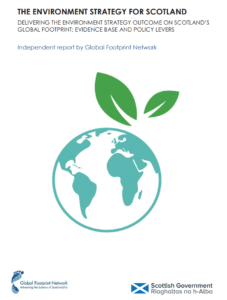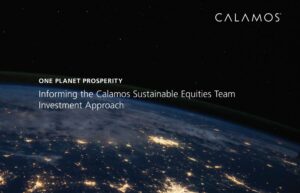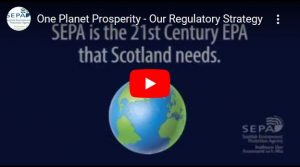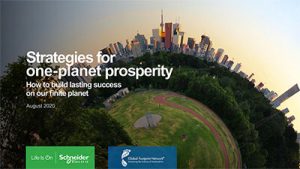“One planet” is neither a metaphor nor a goal. It is a description of our context. It is an acknowledgement that our planet has a limited ecological budget. Human demand (“Ecological Footprint“) now exceeds planetary biological regeneration (“biocapacity“) by 70%. This means that from January 1 to August 1, humanity used as much from the biosphere as the planet can regenerate in the entire year of 2024. Hence Earth Overshoot Day fell on August 1 in 2024. To enable a resilient ecological situation and leave space for other species, it may be advisable for humanity not to demand the entire capacity of planet Earth.
Although the massive overuse of ecological resources still carries barely any financial weight, this overshoot cannot persist. The consequence of depleting resource stocks and accumulating wastes (such as carbon dioxide in the atmosphere) is that markets will be disrupted and unable to adjust smoothly.
Rather than letting disaster end overshoot and open the doors to one-planet misery, we advocate ending it by design and securing human wellbeing. We call this one-planet prosperity. One-planet prosperity stands for a world where all thrive within the ecological budget of Earth.
Measuring One-Planet Prosperity
One-Planet Prosperity turns sustainable development into something more specific. It focuses on the essential tension between securing good lives for all, and doing this without eroding the life support system on which humanity depends.
A simple way to measure it is to track its two dimensions: (i) the state of people’s prosperity and well-being, and (ii) the extent to which human demand fits within our planet’s resource budget.
The former can be approximated by the UN’s Human Development Index (HDI), the latter with Ecological Footprint accounts (Boutaud 2002). Since both of these metrics can be applied to various geographies (globe, region, country, community), this framework can be used to track progress at any scale.
The United Nations considers an HDI greater than 0.8 to be “very high,” and 0.7 to be “high” human development. Universally replicable well-being requires an average per person Ecological Footprint which is lower than the biocapacity available on our planet per person. In fact, it needs to be significantly lower, given growing populations and recognizing wild species’ needs for biocapacity. For example, E.O. Wilson has suggested using just half of Earth’s ecological capacity for people as the other half would help secure 85% of the world’s biodiversity (Wilson 2016).
This means, one-planet prosperity cannot be found outside the quadrant demarcated by an HDI of 0.7 or more, like Viet Nam, Bolivia, or Gabon, and an Ecological Footprint of one Earth or less. Some may even argue for more ambitious aspirations, defined by a tighter quadrant delineated by an HDI higher than 0.8, like Thailand, Costa Rica, or Uruguay, and a Footprint lower than half Earth.
Putting one-planet prosperity to work
Scottish Government
Global Footprint Network was invited by th e Scottish Government to explore options for Scotland to address and reduce Scotland’s international footprint. They were motivated by their own mandate to be responsible global citizens. We answered the question in two parts, first by gathering evidence and then by exploring response options. The report finds that 47% of Scotland’s demand on biological regeneration – its Footprint – is placed overseas. It also shows that, per person, Scotland’s Footprint currently exceeds what its territory’s ecosystems can regenerate – its biocapacity – by 25% i.e. Scotland is operating with a biocapacity deficit.
e Scottish Government to explore options for Scotland to address and reduce Scotland’s international footprint. They were motivated by their own mandate to be responsible global citizens. We answered the question in two parts, first by gathering evidence and then by exploring response options. The report finds that 47% of Scotland’s demand on biological regeneration – its Footprint – is placed overseas. It also shows that, per person, Scotland’s Footprint currently exceeds what its territory’s ecosystems can regenerate – its biocapacity – by 25% i.e. Scotland is operating with a biocapacity deficit.
The report then discusses the need for a systemic approach to managing nature’s budget, given we live now in, what many but the geologists call, the ‘Anthropocene’. To minimize impacts abroad, the report highlights the importance of reducing overall demand. It also emphasizes the importance of reducing overall demand in ways that make Scotland better off, as otherwise efforts will backfire. Therefore, for effective adoption of such measures and avoiding policy conflicts, it suggests prioritizing interventions that simultaneously advance wider societal goals such as long-term prosperity. Further, by considering policy levers, interventions and examples of international best practice (which were also gathered in a complementary report by the Hutton Institute), the report proposes how impact reduction policies can be integrated into current government activities.
CALAMOS: The investment case
 Global Footprint Network supported CALAMOS, an asset investment company, to frame sustainability investments using one-planet prosperity. The logic is simple: They seek to identify global leaders within the investment universe, using “One Planet Prosperity,” as developed by Global Footprint Network. This approach provides a lens to map the potential for value proposition in a world facing persistent overshoot. This recognizes the two main drivers of One Planet Prosperity—improving human lives and reducing ecological overshoot. Using this lens, they identify companies capable of navigating the landscape of human development needs and environmental constraints while seeking to create value for shareholders. These companies, they argue, are at a competitive advantage because of:
Global Footprint Network supported CALAMOS, an asset investment company, to frame sustainability investments using one-planet prosperity. The logic is simple: They seek to identify global leaders within the investment universe, using “One Planet Prosperity,” as developed by Global Footprint Network. This approach provides a lens to map the potential for value proposition in a world facing persistent overshoot. This recognizes the two main drivers of One Planet Prosperity—improving human lives and reducing ecological overshoot. Using this lens, they identify companies capable of navigating the landscape of human development needs and environmental constraints while seeking to create value for shareholders. These companies, they argue, are at a competitive advantage because of:
- Reduced exposure to resource constraints
- Greater retention of asset value
- Increased demand for products and services
- Lower operating costs
For more, check out their one planet prosperity report or check out their short video.
SEPA – Scottish Environment Protection Agency
 Recognizing that environmental compliance no longer suffices to ensure environmental and economic success in times of global overshoot, SEPA chose 2016 “one-planet prosperity” as the framework to reshape its regulatory mandate. The government agency looked for opportunities to give credit to their partners in industry and government who have moved beyond compliance and are advancing one-planet prosperity. Also, they were keen to communicate the benefits of participating in advancing one-planet prosperity to new audiences. To do so, we have collaborated on many events, including for Earth Overshoot Day 2020 the launch of Earth Overshoot Day (with the University of Glasgow) and a seminar with MPs of the five main parties serving in the Scottish Parliament. For Earth Overshoot Day 2021, we produced a special contribution to The Herald, the world’s oldest, still operating newspaper. In 2022, SEPA’s new administration still applies this broader approach to environmental regulation, but no longer calls it “one-planet prosperity”.
Recognizing that environmental compliance no longer suffices to ensure environmental and economic success in times of global overshoot, SEPA chose 2016 “one-planet prosperity” as the framework to reshape its regulatory mandate. The government agency looked for opportunities to give credit to their partners in industry and government who have moved beyond compliance and are advancing one-planet prosperity. Also, they were keen to communicate the benefits of participating in advancing one-planet prosperity to new audiences. To do so, we have collaborated on many events, including for Earth Overshoot Day 2020 the launch of Earth Overshoot Day (with the University of Glasgow) and a seminar with MPs of the five main parties serving in the Scottish Parliament. For Earth Overshoot Day 2021, we produced a special contribution to The Herald, the world’s oldest, still operating newspaper. In 2022, SEPA’s new administration still applies this broader approach to environmental regulation, but no longer calls it “one-planet prosperity”.
Schneider Electric
 The initial goal of our collaboration with Schneider Electric was to enhance the energy efficiency leader’s ability to innovate for sustainability. The partnership soared on the shared vision of promoting solutions that #MoveTheDate of Earth Overshoot Day. As the collaboration between Global Footprint Network and Schneider Electric deepened, we examined to what extent business models can be congruent with moving humanity out of overshoot. In our joint white-paper, we concluded that such business models are not only possible but essential as they help companies drive strategic innovation, stay relevant, and avoid becoming obsolete. This is also underscored by Schneider Electric’s then CEO (now chairman) Jean-Pascal Tricoire.
The initial goal of our collaboration with Schneider Electric was to enhance the energy efficiency leader’s ability to innovate for sustainability. The partnership soared on the shared vision of promoting solutions that #MoveTheDate of Earth Overshoot Day. As the collaboration between Global Footprint Network and Schneider Electric deepened, we examined to what extent business models can be congruent with moving humanity out of overshoot. In our joint white-paper, we concluded that such business models are not only possible but essential as they help companies drive strategic innovation, stay relevant, and avoid becoming obsolete. This is also underscored by Schneider Electric’s then CEO (now chairman) Jean-Pascal Tricoire.


